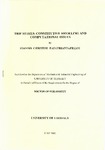| dc.contributor.advisor | Αράβας, Νικόλαος | el |
| dc.creator | Παπατριανταφύλλου, Ιωάννης Χ. | el |
| dc.date.accessioned | 2015-06-09T09:09:14Z | |
| dc.date.available | 2015-06-09T09:09:14Z | |
| dc.date.issued | 2005 | |
| dc.identifier.other | 4549 | |
| dc.identifier.uri | http://hdl.handle.net/11615/6894 | en |
| dc.identifier.uri | http://dx.doi.org/10.26253/heal.uth.358 | |
| dc.description.abstract | TRIP (TRansformation Induced Plasticity) of multi-phase steels is a new generation of lowalloy
steels that exhibit an enhanced combination of strength and ductility. These steels make
use of the TRIP phenomenon, i.e., the transformation of retained austenite to martensite with
plastic deformation, which is responsible for the remarkable enhancement of properties.
A constitutive model for the mechanical behavior of steels exhibiting “Transformation
Induced Plasticity” during martensitic transformation is presented in the Thesis.
Two categories of multiphase TRIP steels are examined. The first category is the two-phase
TRIP steels, in which particles of martensite are isotropically dispersed in an austenitic
matrix; the second includes the four-phase TRIP steels, in which particles of retained
austenite, martensite and bainite are isotropically dispersed in a ferritic matrix. In both cases
the retained austenite is metastable at room temperature and, under the effect of plastic
deformation, transforms to martensite.
TRIP steels are essentially composite materials with evolving volume fractions of the
individual phases. The total strain is assumed to be the sum of elastic, plastic and
transformation parts. No restriction is placed on the magnitude of the strains and appropriate
“finite strain” constitutive equations are developed. Standard isotropic linear hypoelasticity of
homogeneous solids is used in order to describe the elastic behavior of TRIP steels since the
elastic properties of all individual phases are essentially the same. The plastic part is
determined by using homogenization techniques for non-linear composites that have been
developed recently by Ponte-Castaneda, Suquet, and co-workers (Ponte-Castaneda 1996,
Suquet 1996a, Ponte-Castaneda and Suquet 1998). The constitutive equation for the plastic
deformation rate is estimated in terms of the plastic properties of the individual phases. The
transformation strain rate has both deviatoric and volumetric parts and is proportional to the
rate of change of the volume fraction of martensite. The evolution of martensite due to
martensitic transformation is described by a kinetic model, which takes into account
temperature, plastic strain and stress state.
A methodology for the numerical integration of the resulting non-linear constitutive equations
for TRIP steels in the context of the finite element method is developed and the constitutive
model is implemented in a general-purpose finite element program. A methodology for the numerical integration of the constitutive model under plane stress conditions is also
developed.
The constitutive model for the four-phase TRIP steels is calibrated by using experimental data
of uniaxial tension tests of a specific TRIP steel. The model predictions fit the data reasonably
well. The dependence on temperature and stress state is examined.
The constitutive model is used for the simulation of necking in a uniaxial tension test using
the finite element method. TRIP effect hardens the material and increases substantially the
range of uniform elongation. The constitutive model is used also for the calculation of
“forming limit diagrams” for sheets made of TRIP steel; it is found that the TRIP
phenomenon increases the strain at which local necking results from a gradual localization of
the strains at an initial thickness imperfection in the sheet. | en |
| dc.language.iso | en | en |
| dc.rights | Attribution-NonCommercial-NoDerivatives 4.0 International | en |
| dc.rights.uri | http://creativecommons.org/licenses/by-nc-nd/4.0/ | en |
| dc.subject.other | ΧΑΛΥΒΑΣ -- ΜΕΤΑΛΛΟΥΡΓΙΑ | el |
| dc.title | Trip steels : constitutive modeling and computational issues | en |
| dc.type | doctoralThesis | en |
| heal.recordProvider | Πανεπιστήμιο Θεσσαλίας - Βιβλιοθήκη και Κέντρο Πληροφόρησης | el |
| heal.academicPublisher | Πανεπιστήμιο Θεσσαλίας. Πολυτεχνική Σχολή. Τμήμα Μηχανολόγων Μηχανικών Βιομηχανίας. | el |
| heal.academicPublisherID | uth | en |
| heal.fullTextAvailability | true | en |
| dc.rights.accessRights | free | en |
| dc.contributor.committeeMember | Χαϊδεμενόπουλος, Γρηγόρης Ν. | el |
| dc.contributor.committeeMember | Καραμάνος, Σπύρος Α. | el |



